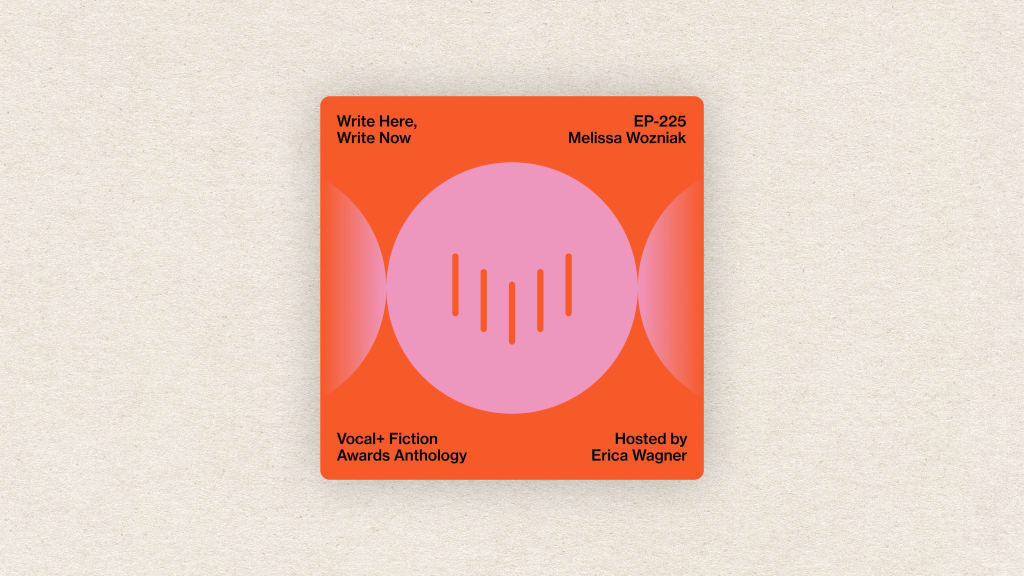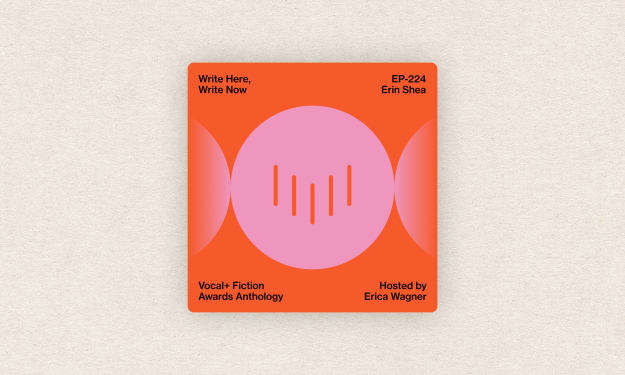Write Here, Write Now: Twenty Miles South of Macon by Melissa Wozniak
In Season 2 of Write Here, Write Now: A Vocal Podcast, host Erica Wagner interviews winners of the Vocal+ Fiction Awards

The humdrum of the everyday can wear on a person. Grocery store runs, paperwork, bills. For Mabel Schwartz, a solo trip on the open road is the solution, even if it scares her. In a Super 8 Motel along the way, she discovers what she really needs.
What was the impetus for your winning story?
There is a sentence in the story that comes from some lines I scribbled out once at a truck stop motel. It was a description—the Waffle House, the single stoplight dancing its reflection in a puddle—but what I remember is the feeling that washed over me while writing those words. It was an unnerving, dissociative moment of losing my sense of place, of being cosmically adrift, because that exact scene could have been anywhere in America. The parameters of identity are shaky at best.
I spent the pandemic in New York, which has the unique capability of being somewhere you can never be alone while also being, at times, the loneliest place on earth. And then suddenly, here are these isolated little bubbles created out of distance and wariness, rules and fears, and now everyone’s sense of place and identity is blurred around the edges. It is amazing how quickly our ability to interact as humans can crumble. Six months in, a friend told me how she knocked into someone at a bodega and how they both stood there awkwardly until the woman said, “I’m sorry, I don’t know how to do this, you’re the first person I’ve talked to in three days.” I started noticing the people around me in a different way, imagining what their reality is like, questioning assumptions. At the end of the day, we are each our own ship, charting our own course, inherently alone. There can be distress in that realization, but also an uncharted frontier of freedom. The character of Mabel emerged from there.
What does it take for a story to grab you? How do you grab your audience?
The first paragraph tells me whether someone is writing from the head or writing from the heart. If I feel myself being pulled into that heady space, I move on. Simple, direct, and honest is what grabs me. There are rare moments when a dimensional shift happens, when time and space disappear and it’s like you and the writer are together in a secret room, the only two people in the world. Once someone takes me to that secret room, I’m theirs. The story could have no plot at all, it could be three lines about a meeting with a stranger, but if it lands in a certain way, somewhere in the chest cavity where an armory of unexplored emotions lives, it stays with me for a long time. Lydia Davis’s work comes to mind.
Is there a strategy? I don’t know. Precise language helps—I spend more time playing with the musicality of my words than I do actually writing them—but beyond that, it’s a matter of staying honest, noticing when I’m swimming too deep in the folds of my brain, and going outside.
Who are your favorite writers and why? Do you have any favorite Vocal Creators?
That’s become an interesting question when there’s an infinite breadth of writing you can access in an instant. I used to look for specific authors because it involved going to a bookstore or library and physically acquiring a title. It was a commitment, so it didn’t always encourage exploration. I still go deep with books, but there is a certain thrill of the unexpected when you follow the breadcrumbs of joy and wander around online. You end up discovering you’re into Taiwanese fiction or Beat-style free verse when you didn’t even know these things existed. That sense of a treasure hunt is why I love Vocal.
For me as a writer, Alice Munro shared her sense of interiority, Raymond Carver gifted his dialogue, Joan Didion taught me to keep a notebook, and Joseph Heller revealed how wickedly delicious word play can be. Thich Nhat Hanh’s gentle poems break my heart. I have story collections from Sub-Saharan Africa, India, and other places I’ve spent significant parts of my life, and they’ve revealed a depth to the culture I wouldn’t know otherwise.
These days I’m obsessed with flash fiction. People ask if I’m working on a novel, and I’m like, “No, I want to learn how to write a novel in 300 words.”
How has sharing your writing in life and on Vocal affected you as a Creator?
A lot of artists get caught in the trap of thinking they need to polish their craft until it’s good enough to be released into the world. I did, and the truth of it is when you’re sitting in your own echo chamber, you don’t end up doing a lot of creating. That shifted last year when some friends started a WhatsApp group that posted morning prompts from the New York Times. It was super informal, a few lines among friends, but that’s when I began to love to write again. Something is different when you’re doing it for other people. There is an inherent realization that it isn’t about you, any of it. The more I shared, especially on Vocal, the more feedback I got that my writing, you know, actually affects people. And I started thinking of all the things I’ve read through the years that have changed my understanding of the world, changed my understanding of myself, and in some cases, changed the direction of my life. None of those writers set out with the intention to change anything, they just told a story that was inside of them itching for a way to get out. I doubt that John Carlin, when describing rugby formations in Johannesburg, knew that a girl in Nashville was going to read it one day and move to Africa. But I’m so grateful that his words didn’t stay on the desktop of his personal computer. The effects of our work aren’t ours to know, but the task of putting it out there is.
What advice do you have for other Creators?
Loosen your grip on what you make. Let it breathe. The most liberating thing I’ve come to learn is that this human self really has little to do with what appears on the page. We live in an immensely creative, intelligent soup of existence that’s waiting to be noticed, and when that happens, it flows through you. You can choose to see monotony, or you can choose to see magic. It’s there. Start having an active dialogue, asking for inspiration and expecting it to appear. Sometimes it’s a title snatched from a verse by a street musician. Or a robin that flies by and dredges up something your grandmother once said. Mabel was sitting in that Super 8 motel for weeks because I had no idea how to end the story. I finally got tired of thinking and went for a walk with the intention of finding something that would tell me where it needed to go. There on the neighbor’s stoop was a book on Japanese ikebana, and within ten minutes I had my ending. That’s the sum of my creative practice these days, acclimating my eyes to see the magic in what’s already there.
About the Creator
Write Here, Write Now: A Vocal Podcast
Sex, death, relationships, nature, families... If you like to stop, think and consider things a little differently, join host Erica Wagner as she introduces a new Vocal creator’s story each week.





Comments (2)
Wow
Good